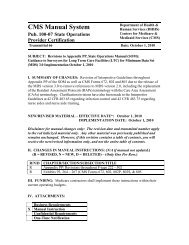LOUISIANA Community Mental Health Services Block Grant ...
LOUISIANA Community Mental Health Services Block Grant ...
LOUISIANA Community Mental Health Services Block Grant ...
You also want an ePaper? Increase the reach of your titles
YUMPU automatically turns print PDFs into web optimized ePapers that Google loves.
Office of Client Affairs<br />
This office continues to actively work towards the development and statewide implementation of<br />
Peer Support Specialists, Wellness Recovery Action Planning (WRAP) and other initiatives that seek<br />
to encourage consumer/family choice and empowerment throughout the system of care as Louisiana<br />
moves towards a recovery modality. As of 2010, the Office of Behavioral <strong>Health</strong> has implemented<br />
Peer Support <strong>Services</strong> throughout the majority of Louisiana, using the curriculum developed by<br />
Recovery Innovations. Currently, there are 101 trained and certified Peer Support Specialists, 52 of<br />
whom are now employed in a variety of capacities throughout the system of care. Examples of job<br />
duties include conducting Peer Support and WRAP groups, working with clients on an individual<br />
basis to develop goals and serving as a bridge for clients when first entering the clinic. In addition to<br />
the Peer Support program, the Office of Behavioral <strong>Health</strong> has also actively been integrating WRAP<br />
within the system of care. Currently, there are 69 trained WRAP Facilitators many of whom are<br />
conducting groups across the state. Since the inception of the WRAP is it approximated that over<br />
1000 individuals have been introduced to the concepts of WRAP in some capacity. For 2010-2011, it<br />
is the goal of the Office of Behavioral <strong>Health</strong> to continue to fully support and certify peers and to<br />
ultimately train peers as trainers for both WRAP and Peer Support so that the programs can achieve<br />
long-term sustainability.<br />
Transition to Local Governing Entities (LGEs)<br />
Legislation was passed during the 2006 legislative session calling for DHH to develop a plan to<br />
facilitate the remaining geographic regions to transition to local governing health care districts or<br />
authorities. Act 373 of the 2008 regular legislative session provided for a specific process for the<br />
remaining regions of the state to become LGEs (Local Governing Entities). Based on this law, staff<br />
of the then OMH Division of Policy, Standards, and Quality Assurance developed a complete<br />
Readiness Assessment Toolkit. This toolkit contained flowcharts, copies of the applicable law and<br />
regulatory agreements, documents that guide the development of a governing board,<br />
policies/procedures, and a Readiness Assessment fidelity tool and user manual. The Director of the<br />
Division along with the Bureau Chief for Workforce Development within the Division formed the<br />
leads for a Readiness Assessment team consisting of representatives of OAD, OMH, OCDD, DHH<br />
legal division, and DHH fiscal and policy departments. Using the toolkit, the Readiness Assessment<br />
team completed a Phase I, II, and III assessment of a region and as of July 1, 2010, the former Region<br />
3 consisting of the Houma/Terrebonne area of the state begins Phase IV of the LGE transition process<br />
as South Central Louisiana Human <strong>Services</strong> Authority (SCLHSA). That makes five LGEs, with five<br />
Regions remaining that are in various stages of preparation to become LGEs. Local governing<br />
entities (LGEs) have the responsibility for providing services to persons with mental illness,<br />
substance use and abuse disorders, developmental disabilities, and some functions of public health.<br />
The newly created Office of Behavioral <strong>Health</strong> will modify the organizational structure at the<br />
administrative level and align leadership to achieve strategic directions and support transition to<br />
Human Service Districts.<br />
Provision of Appropriate Medications<br />
OBH now has a policy that allows non-physician professionals who have prescriptive authority to<br />
prescribe within OBH facilities. The inclusion of Medical Psychologists and Advance Practice Nurse<br />
Practitioners allows patients and consumers greater access to the care they need. Several mental<br />
health clinics have taken advantage of this added resource to the benefit of their clientele. The<br />
pharmacy continues to offer an unrestricted formulary of medications for mental illness, which<br />
includes all of the newer antipsychotics, antidepressants, and mood stabilizers. The ability to offer<br />
PART C <strong>LOUISIANA</strong> FY 2011 PAGE 91<br />
SECTION II: ADULT & CHILD/ YOUTH<br />
IDENTIFICATION & ANALYSIS OF SERVICE SYSTEM’S STRENGTHS, NEEDS, & PRIORITIES<br />
RECENT SIGNIFICANT ACHIEVEMENTS
















